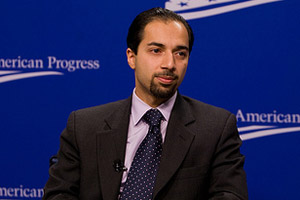Spencer Ackerman and Matt Yglesias have both weighed in on my post this morning about the attacks on Trita Parsi, the founder of the National Iranian American Council. Unlike Michael Goldfarb, Jeffrey Goldberg backed off the implications of his original comments (that Parsi does “legwork for the Iranian regime”) when I emailed him. But Goldberg is still embracing a double standard, Spencer says:
Goldberg has a fairly low bar for people who write that, say, AIPAC does anything untoward or is an organization that represents anything nefariously deviant from the norm in ethnic American lobbies. He insists on, shall we say, a certain precision in discourse. Yet he has absolutely no problem saying that a guy who stood out in front in the U.S. in cheering on the anti-regime protesters is soft on the regime! “I assume, though I don’t know, that Parsi doesn’t take Iranian government money or Iranian government instruction, either.” Let’s employ a thought experiment. Say, I don’t know, Steven Walt or John Mearshimer wrote that about AIPAC. Would Goldberg consider that a judicious statement or a weasel-worded slander?
The Faster Times‘ Dan Luban made a similar point in his original post on the Parsi attacks:
It need hardly be said that these are the same commentators who would scream anti-Semitism if anyone were to level similar allegations against Jewish-American political figures. Yet it is undeniable that Goldfarb, Goldberg, and Kramer hold positions that are far closer to the Israeli government’s than Parsi’s position is to the Iranian government’s. Would it therefore be fair to label Goldfarb as “the Israeli government’s man in Washington,” or Goldberg as someone who “does a lot of leg-work for the Israeli government?”
Yglesias says the campaign against Parsi is “soon to be joined, according to my information, by a larger set of right-wing pundits and ‘reporters.'” When I spoke to Parsi, he suggested that the allegations against him are based on charges that were made by Daioleslam Seid Hassan, a man Parsi sued for defamation last year. That case is ongoing, but it would definitely be easy for someone who was interested in attacking Parsi to reprint and draw more attention to Hassan’s original charges. That’s fine, but anyone who writes about those charges should make sure to note that Parsi disputes the allegations and is suing Hassan for defamation.














